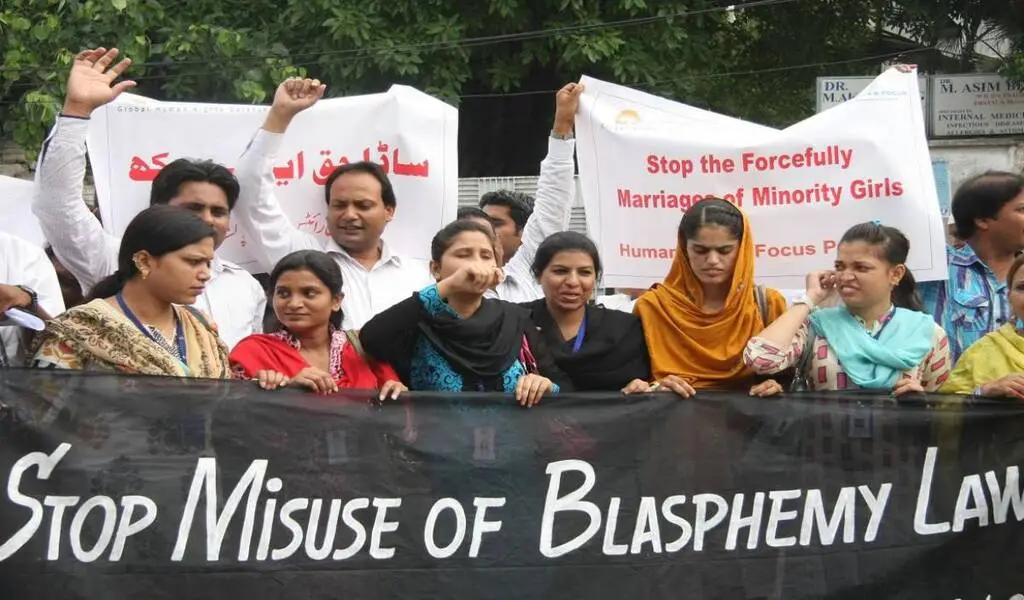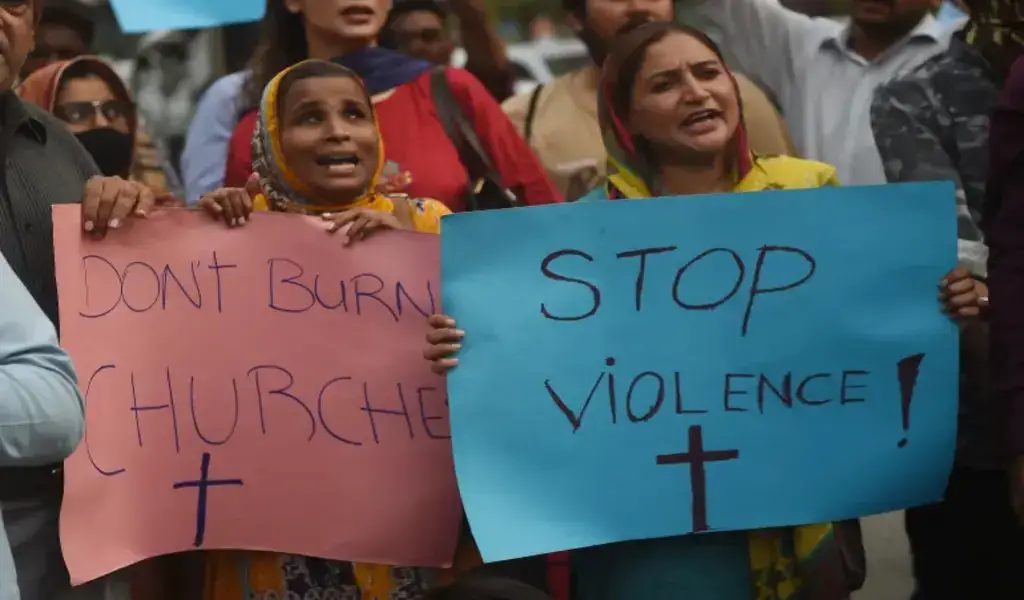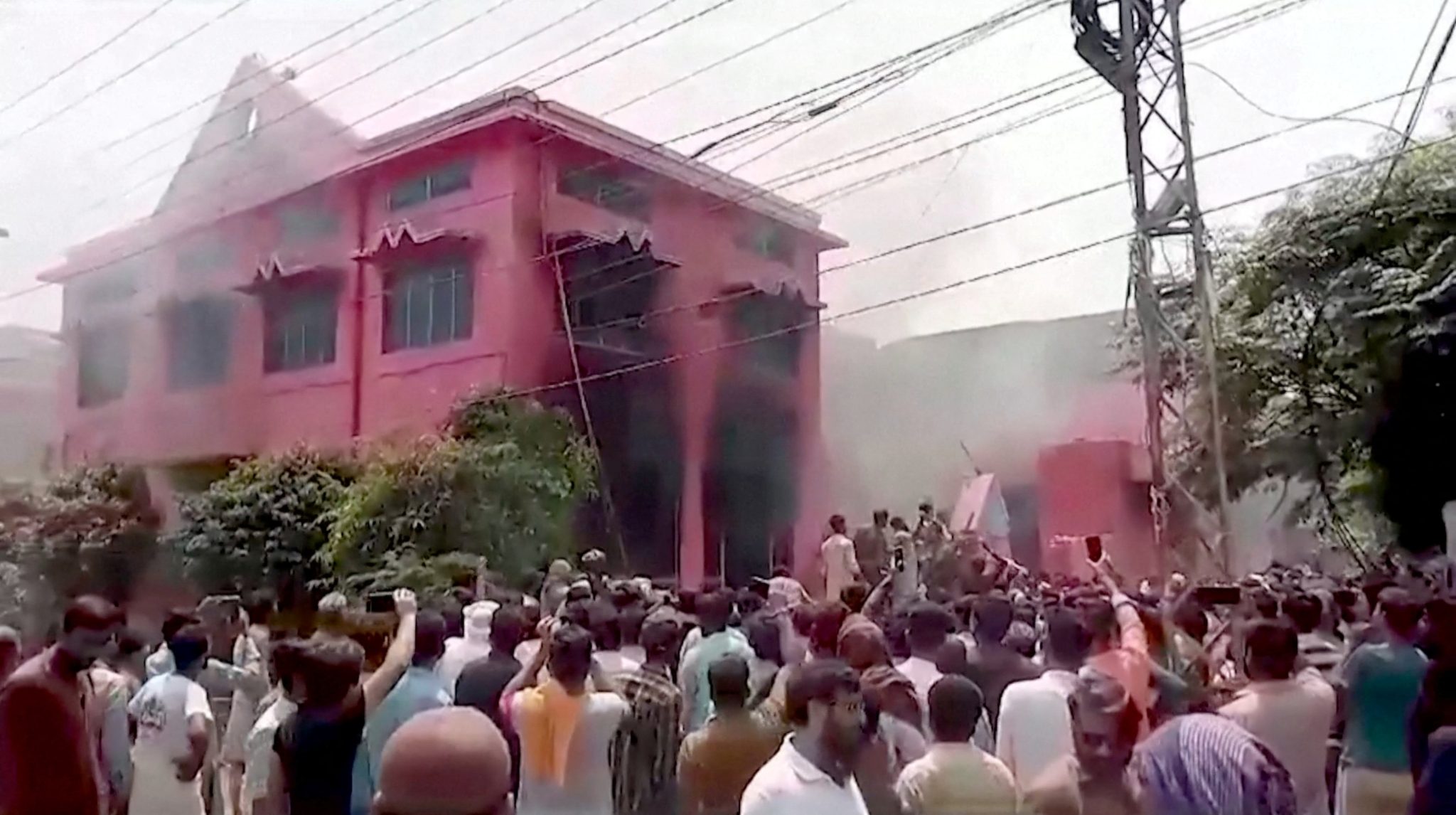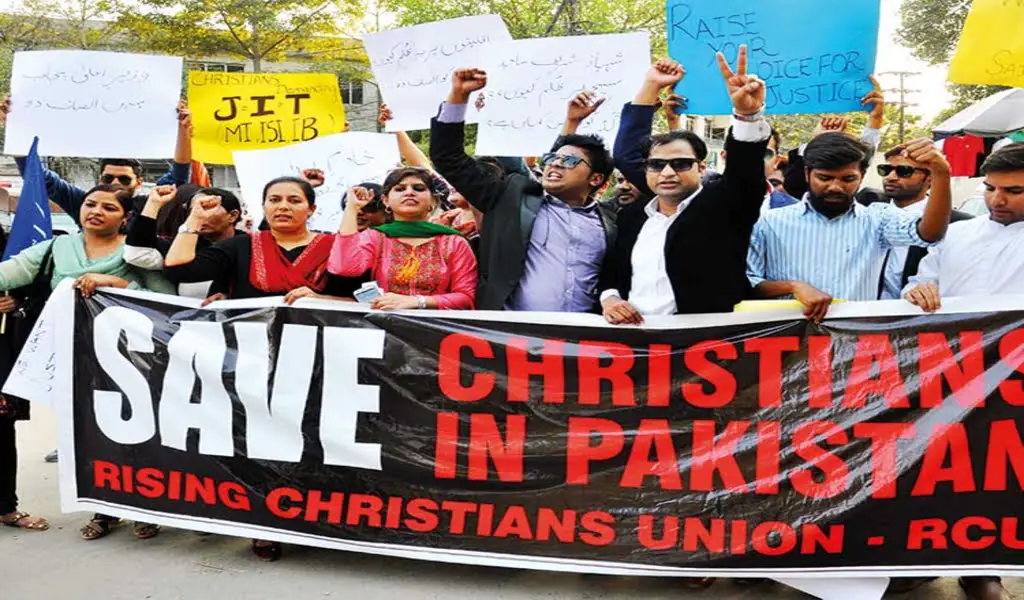News Asia
Inflammatory Outbursts: Recent Violence And Blasphemy Accusations In Pakistan

(CTN NEWS) – The glare of scrutiny once more finds itself upon Pakistan’s statute on blasphemy, as a fervent assembly of Muslims ignited flames that engulfed Christian sanctuaries and abodes in the eastern fringes of the nation in recent days.
The fervor stemmed from allegations directed at two community members, asserting their desecration of the Quran.
On the day denominated Friday, the law enforcement machinery of Pakistan apprehended two individuals from the Christian fold, who stand accused of violating the edicts of blasphemy.
In the dominion of Pakistan, where the majority adheres to the Islamic faith, such allegations carry an incendiary weight.
The merest insinuation of affront to the tenets of Islam or the venerated Prophet Muhammad can kindle a firestorm of vigilantism, wherein death oft graces the transgressors’ threshold.
The law enforcement authorities have indicated that up to this juncture, a total of 146 individuals have been apprehended in connection with the assault on the Christian community within the precincts of Jaranwala, situated in the industrial expanse of Faisalabad city on the day that corresponded to Wednesday.
Detractors assert that the statute pertaining to blasphemy often finds itself employed in a manner contrary to its intended purpose, wielded against Pakistan’s minuscule factions of minorities, and occasionally even invoked against adherents of the Islamic faith as a means to resolve personal grievances.
The Evolution of Blasphemy Laws: From Colonial Origins to Modern Advocacy
The statute of blasphemy, as delineated within the legal framework, dictates that any form of “detrimental discourse, expressions, and the like,” concerning the venerated Holy Prophet Muhammad, whether uttered verbally, inscribed in writing, depicted visually.
or conveyed through implication, allusion, or suggestion, be it direct or indirect, shall be met with the gravest of penalties, including capital punishment or a lifetime of incarceration, accompanied by the imposition of monetary fines.
This legislative construct, with certain components originating from the era of British colonial rule, lay largely dormant until the era of the 1970s.
It was during this period that it underwent fortification, a process that was integral to the broader endeavor of infusing Islamic principles into the governance structure of the state.
The epoch of the 1980s, marked by the military dictatorship of General Muhammad Zia ul-Haq, witnessed the reinvigoration of this legal mandate.
The former Prime Minister, Imran Khan, aligned himself with this legal provision and, as recently as 2021, advocated for a collective effort amongst nations with a Muslim-majority populace.
This endeavor aimed to rally these nations in an appeal to Western governments for the codification of laws that would criminalize any form of disparagement directed at the revered prophet of Islam.
To what extent is violence related to blasphemy a prevalent issue in Pakistan?
Instances of violence stemming from accusations of blasphemy are a recurrent phenomenon within the landscape of Pakistan.
While no instance of capital punishment has been executed in relation to blasphemy, the realm is marked by a prevalent occurrence of convictions tied to this charge.
Although a substantial proportion of these convictions encounter their demise upon reaching higher echelons of the judiciary, vigilant throngs, animated by a frenzied fervor, have summarily taken matters into their own hands.
This grim tableau has materialized even prior to formal court proceedings, leading to the lynching of numerous individuals.
The grim roster of victims spans a spectrum, encompassing members of religious minority groups, notable political figures, scholars, pupils, clergy, and those grappling with mental infirmities.
The modus operandi of these extrajudicial killings varies widely: immolation, hanging orchestrated by agitated crowds, summary execution within court chambers, and grisly murders enacted by the wayside, constitute but a few among the myriad ways in which these heinous acts unfold.
As documented by indigenous media outlets and researchers, a grim tally of at least 85 lives has been claimed in connection with allegations of blasphemy since the inception of the decade of the 1990s.
The judicial officials presiding over cases steeped in allegations of blasphemy have relayed accounts of relentless coercion, compelling them to decree convictions irrespective of the evidentiary foundation.
Such grim choices are often motivated by the specter of physical retribution in the event of dissent.
When the maelstrom of violence, kindled by sentiments of anti-blasphemy fervor, erupts, the local constabulary has, on occasions, chosen to adopt a passive stance, allowing marauding assemblages to enact their onslaughts unchecked.
This abdication of intervention often emanates from a chilling fear: that any intervention might confer upon them the label of “blasphemers,” subjecting them to the same brutal fate they ostensibly seek to avert.
The Aftermath of Punjab Governor’s Assassination: Blasphemy Allegations and Contemporary Realities in Pakistan
Since the year 2011, when the assassination of Punjab Governor Salmaan Taseer transpired at the hands of his personal sentinel, following his advocacy for reform within the framework of blasphemy laws, the landscape has been punctuated by a profusion of allegations rooted in blasphemy.
This event marked an inflection point beyond which the contours of mainstream discourse pertaining to this subject became exceedingly challenging to navigate.
In contemporary times, the terrain is riddled with instances where baseless assertions of blasphemy are wielded as a coercive instrument, skillfully directed at opponents enmeshed in disputes.
This stratagem, intriguingly, extends its influence even to the upper echelons of political leadership. Notably, the perpetrator behind Taseer’s demise garnered acclaim from certain quarters.
effectively signaling the emergence of the Tehreek-e-Labbaik Pakistan (TLP), a right-wing political faction that has amassed considerable sway, championing the notion of the decapitation of blasphemers.
The ascent of the TLP has precipitated a notable surge in the lodgment of blasphemy charges, propelled by ideological moorings.
Despite the proscription levied upon the group, discerning sources within the government and the populace assert that certain members have been implicated in the recent wave of violence. In response, the TLP vehemently rebuts the accusations leveled against it.
As the year 2023 unfolds, a disquieting tableau emerges, with no fewer than 53 individuals incarcerated across the expanse of Pakistan, ensnared within the tentacles of blasphemy charges, as attested by the United States Commission on International Religious Freedom.
Paradox and Peril: Blasphemy Accusations and Religious Minorities in Pakistan
A prevailing trend within Pakistan’s tapestry of blasphemy accusations manifests a paradox, wherein a majority of those ensnared within this intricate web are of the Islamic faith themselves.
However, this paradox is tinged with a pronounced poignancy, as it is the members of religious minorities who confront a particularly ominous and acute peril, as underscored by human rights advocacy groups.
Within this labyrinth of blasphemy allegations, Christians—constituting a slender fraction, approximately 1.3 percent, of Pakistan’s vast populace of 250 million—find themselves perilously exposed.
Regions spanning the urban landscapes of Lahore, Gojra, Jaranwala, and the national capital Islamabad have borne witness to the conflagration of neighborhoods, razed to the ground or subjected to brutal attacks in the aftermath of allegations tied to blasphemy.
Recent years have witnessed these ominous occurrences, casting an unrelenting pall of danger over these communities.
The cornerstone upon which convictions pivot rests upon the edifice of witness testimonies. Yet, the foundations of these testimonials frequently intertwine with the tendrils of personal vendettas.
Activists advocating for justice underscore that this intricate interplay underscores the frailty of the legal framework, which is often wielded to settle personal scores, rather than to administer fair and unbiased justice.
RELATED CTN NEWS:
PIA’s CBA Union Initiates Symbolic Strike With Temporary Closure Of Booking Offices In Pakistan
China’s Fertility Rate Plummets To Unprecedented Lows: Fertility Landscape And Remedial Measures
76th Independence Day: Why Pakistan Celebrates Independence Day On August 14?
































